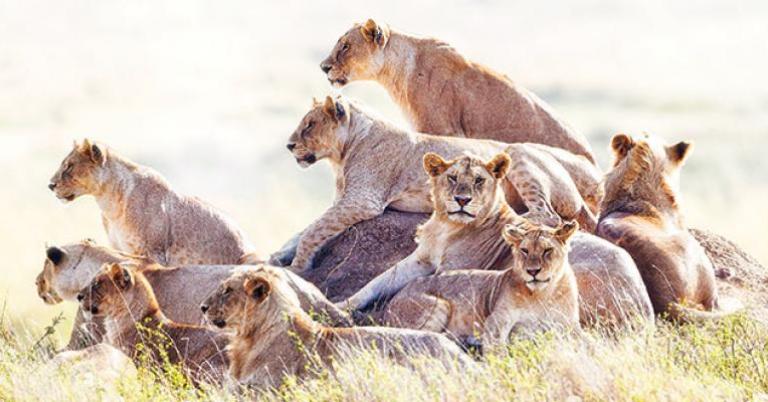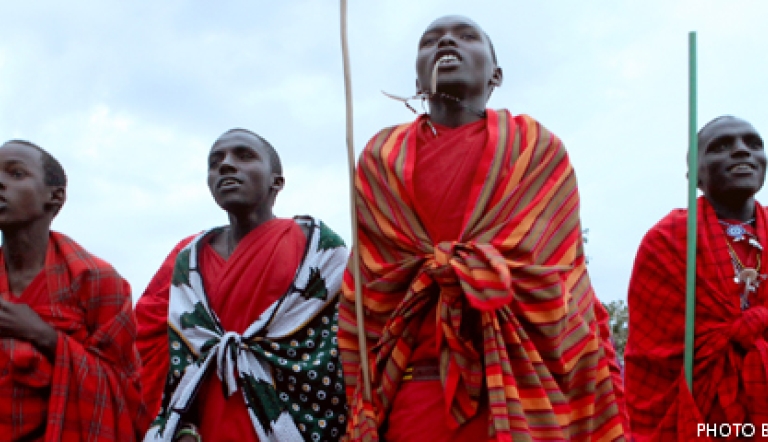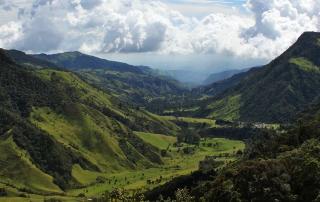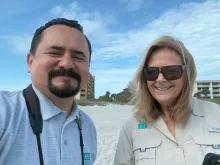From the annual Great Migration to the origins of humanity, Tanzania is truly the crown jewel of East Africa.
Each year, millions of animals cross the Mara River dividing Kenya from Tanzania on a quest to find fresh grass sprung from recent rains. The annual journey stretches nearly 1,800 miles and takes eight to nine months to complete, from the crossing of treacherous rivers to the promise of endless lush grasslands. The migration is a highly complex natural phenomenon, the timing of which varies widely from year to year. For visitors hoping to see the Great Migration during a Tanzania safari, we offer comfortable mobile tented camps to move along the migration route with the animals, providing the best vantage point to witness this dramatic natural spectacle.
Tanzania has many national parks and protected areas to visit, including Serengeti, Lake Manyara, Tarangire, and Mt. Kilimanjaro. The densest known population of lions lives in the Ngorongoro Crater, as do elephants, rhinos, buffalo, and leopards. Though most famous for its large mammals, Tanzania is also home to move than 1,000 bird species, including a number of endemic and regional specialties. From the dazzling and aptly-named Beautiful Sunbird to the grotesque Marabou Stork, birding in Tanzania offers a world of contrasts.
Beyond wildlife game drives and captivating landscapes, no trip to Tanzania is complete without pausing to discover the history and traditions of the Maasai and Iraqw tribes through authentic cultural immersion experiences. The roots of human history were discovered at Olduvai Gorge when Mary and Louis Leakey excavated the earliest known specimens of the human genus Homo habilis, making Tanzania one of the world’s best places to study anthropology.
With decades of travel experience in Tanzania, Holbrook offers group tours in Tanzania that provide unforgettable and transformative journeys.
Environments
The beautiful country of Tanzania is home to three of Africa’s Great Lakes: Lake Victoria, the largest lake in Africa by area and one of the primary headwaters of the Nile; Lake Malawi, home to more species of fish than any other lake; and Lake Tanganyika, the longest freshwater lake in the world. In addition to its impressive size, Lake Tanganyika marks lowest point below sea level in Africa, while in the northeast mountainous region the towering Mt. Kilimanjaro marks the highest point above sea level in Africa.
National Parks & Wildlife
Much of Tanzania’s land is preserved as national parks or reserves. Among the most popular national parks are Tarangire National Park, famed for its populations of elephants, baobab trees, and tree-climbing lions; Lake Manyara National Park, known for its huge flocks of flamingos and exceptional birding; Serengeti National Park, which contains the greatest concentration of game animals in the world; and Ngorongoro Conservation Area, a large, intact volcanic caldera inhabited by a unique concentration of wildlife. For many, the highlight of an African safari is seeing the “Big Five” game animals, which consists of African Elephant, Black Rhinoceros, African Lion, Cape Buffalo, and African Leopard.
The Great Migration
Each year, two million animals migrate between the plains of the Serengeti in Tanzania and Maasai Mara in Kenya. The journey is a dramatic one. During the perilous crossing of the Grumeti River, large crocodiles lie in wait for their annual feast. Cape buffalo and elephants congregate in the riverine forests while large groups of hippos cool off in the murky river waters. This is also mating season for wildebeest that bellow and grunt to advertise their presence, creating a cacophony of sound. Private safari camps, scattered throughout the key migration route, provide dramatic and transformative access to the nearly 1800-mile round trip trek for food and survival.
Anthropology
Tanzania holds the keys to the origins of humanity. Oldupai Gorge is one of the most important paleoanthropological sites in the world, and the location where archaeologists Louis and Mary Leakey excavated the ancestral fossils of hominids that revolutionized our ideas about human history and evolution. Today, Tanzania is home to more than 120 tribes and ethnic groups, most of Bantu origin. The major non-Bantu people on the mainland are the Maasai who inhabit the northeastern section of the country. The Maasai tribes maintain a semi-nomadic lifestyle, and welcome visitors to their villages to observe their traditions, learn about their beliefs, and experience their pastoral way of life.
Entry & Exit Requirements
U.S. and Canadian citizens must have a valid passport to enter Tanzania. Passports must be valid for at least six months after the date of entry and have at least one blank page available.
A tourist visa is also required for entry. An e-visa can be obtained online in advance by completing the e-visa application form and making payment online with a credit card or bank transfer at www.immigration.go.tz. Processing can take up to 10 days; please allow yourself sufficient time prior to travel. If the e-visa is approved, you will receive a “grant notice” via email. You must present a printed copy of the grant notice to the Immigration Officer on arrival at the airport in Tanzania.
U.S. citizens may also opt to obtain a tourist visa upon arrival at the airport in Tanzania. Expect delays if you choose to obtain a visa at the airport. The fee is $100 for a 12-month multiple-entry visa (subject to change). Be prepared to pay in cash, as credit card payments can be unreliable due to connectivity issues.
If you are not traveling with a U.S. passport, please check with the Tanzanian Embassy for the requirements based on your nationality.
Zanzibar
Zanzibar is a semi-autonomous region in Tanzania. Be prepared to show your passport and explain your visa status when entering or departing Zanzibar.
Additionally, travelers to Zanzibar must complete an online Public Health Surveillance Form within 24 hours before arrival. This form is available at: https://healthtravelznz.mohz.go.tz/traveller.
Effective October 1, 2024, all foreign visitors to Zanzibar must purchase mandatory inbound travel insurance prior to their trip. This insurance must be acquired from the Zanzibar Insurance Corporation, even if travelers already have other travel insurance. The government will provide a QR code to access the purchase link. The insurance is USD $44 per person and is valid for 92 days. Failure to comply may result in denied entry at immigration checkpoints.
Health Information
IMMUNIZATIONS
The Centers for Disease Control recommends that all travelers be up to date on routine vaccinations such as measles-mumps-rubella (MMR) vaccine, diphtheria-pertussis-tetanus vaccine, varicella (chicken pox) vaccine, and your yearly flu shot before every trip.
There are no vaccinations required for entry into Tanzania or Zanzibar, unless you are traveling from a country where yellow fever transmission is a risk, in which case proof of yellow fever vaccination is required.
Additionally, the CDC recommends inoculation against hepatitis A, hepatitis B, and typhoid for most travelers to Tanzania.
Please consult your physician for additional information and recommendations based on your individual circumstances.
MALARIA
The CDC warns that travelers to Tanzania may be at risk for exposure to malaria. Malaria is caused by a parasite found in Anopheles mosquitos, which are active from dusk until dawn. Prevention is twofold: the use of anti-malarial drugs and the prevention of insect bites. If you choose to use an anti-malarial drug, as recommended by the CDC, see your physician for a prescription.
To protect against mosquitos and other biting insects, cover exposed skin with lightweight, long-sleeved shirts and pants, consider treating clothes with permethrin, and use an insect repellent containing an active ingredient like DEET or picaridin. Apply sunscreen first, followed by the repellent (preferably 20 minutes later).
OTHER INSECT-BORNE ILLNESSES
In addition to malaria, the CDC warns that travelers may be at risk for other illnesses transmitted by mosquitos, ticks, or sand flies, such as dengue fever, chikungunya, African tick-bite fever, and others. Travelers are advised to protect themselves against insect bites using the measures noted above.
After spending time outdoors, especially in grassy or wooded areas, the CDC recommends showering and conducting a full-body check for ticks. If you find a tick attached to your skin, safely remove it as soon as possible.
WILDLIFE
Follow all instructions from your guides regarding wildlife. Animals may become aggressive to protect themselves, their young or their mates, or to guard a food supply. Do not make sudden movements either toward or away from them, as this may be interpreted as threatening or territorial. Avoid stray dogs, as they may carry rabies. In the unlikely event of being bitten, clean the wound and control bleeding. Seek medical attention immediately.
Parasites & Bacteria
Avoid swimming or bathing in freshwater lakes or rivers. Some freshwater bodies contain disease-causing parasites or bacteria that may be contracted through contact with infected water.
SUN EXPOSURE
The effects of the sun can be damaging to the eyes and skin. Spending time outdoors exposes you to the sun’s harmful ultraviolet (UV) rays, even on cloudy days. To protect yourself from the sun, use a broad spectrum sunscreen of at least SPF 15, protect skin with clothing, wear a wide-brimmed hat and sunglasses, and drink plenty of fluids.
CPAP Machines
Some safari lodges and tented camps in remote areas of Tanzania supply electricity through generators or solar power, and shut off electrical power during part of the night in order to conserve energy. If you use a CPAP machine, please be prepared to bring a battery pack (and any necessary cables) to power your equipment when electricity is not available. The battery pack can be charged during the day in preparation for nighttime use. Please be aware that if you do not have a battery pack, some lodges may assess a fee to run electricity through the night.
Travelers Diarrhea
The CDC warns that travelers’ diarrhea is one of the most common travel-related illnesses worldwide. Consumption of contaminated food and water may cause diarrhea. To avoid this, do not drink tap water, and use bottled water to brush your teeth. Avoid ice and uncooked vegetables or fruit without a peel. When in doubt, ask your guide. Restrict yourself to cooked food at restaurants, and avoid food sold on the streets. If you contract diarrhea, it is important to drink large quantities of purified water. Consult your doctor for appropriate medication should you experience diarrhea.
Respiratory Illness Protocols
Please review our Respiratory Illness Protocols page, which explains our policy and procedures if you or another traveler should develop symptoms of a respiratory illness during your trip. Your participation in a Holbrook Travel program indicates that you are in agreement with these protocols.
Currency
The currency of Tanzania is the Tanzanian Shilling.
Electricity
The electrical current in Tanzania is 220V 50Hz AC. Travelers from the United States need to use a converter.
Time Zone
The time zone of Tanzania is East Africa Time Zone (UTC+03:00).
Tanzania does not observe Daylight Saving Time.
Departures and arrivals on flight schedules are listed in the local time.
Communications
PHONES
Tanzania’s country code is +255.
To call Tanzania (from the U.S.): Dial 011-255-(xx-xxx-xxxx)
To call the United States: Dial 001-(xxx-xxx-xxxx)
Please check with your cell phone provider if you’re unsure whether or not your cell phone will work internationally. Be aware that you are likely to incur additional charges for international use. It may be more affordable to purchase a local SIM card upon arrival.
INTERNET
Internet is not reliable in Tanzania, but major cities often have cafes and hotels that offer WiFi.
Reading List
FIELD GUIDES
Wildlife of East Africa
Martin B. Withers
This take-along guide to 475 common species of birds, mammals, reptiles, insects, trees and flowers of East Africa features full-color photographs with detailed descriptions on facing pages.
The Safari Companion
Richard Estes
An invaluable encyclopedic guide to Africa's mammals by a noted scientist, this perennial bestseller includes black-and-white drawings, an overview of each animal group and in-depth information. Written with the typical safari-goer in mind.
African Wildlife
James Kavanaugh
A laminated foldout guide illustrating almost 150 species of African animals, designed for quick reference in the field.
Birds of Kenya and Northern Tanzania
Dale Zimmerman, Donald Turner & David Pearson
Ideal for the Serengeti, this field guide features 124 stunning color plates.
Birds of the Masai Mara
Adam Scott Kennedy
Kennedy's compact guide, full of local knowledge on habitats and birding spots, features 300 color photographs.
Birds of the Serengeti and Ngorongoro
Adam Scott Kennedy
Featuring a habitat-based approach to more than 270 bird species, this handy guide to fowl in Tanzania's Serengeti National Park, Ngorongoro Conservation Area and Speke Gulf includes 480 color photos and accessible text.
East Africa Birds
James Kavanagh
A folding wildlife guide designed for quick reference in the field. With full-color images and text, it features more than 120 birds often seen in East Africa's forests, wetlands, marshes, deserts and coastlines.
East Africa Wildlife
James Kavanagh
A folding wildlife guide designed for quick reference in the field. With full-color images and text, it features the creatures often seen in the legendary Serengeti and Maasai Mara reserves and beyond.
Kingdon Pocket Guide to African Mammals
Jonathan Kingdon
A conveniently compact edition of Kingdon's gloriously illustrated Field Guide to African Mammals. The guide includes abbreviated information on identification, distribution, ecology and conservation status and 480 outstanding color illustrations and maps.
The Kingdon Field Guide to African Mammals
Jonathan Kingdon
This stunningly-illustrated, comprehensive field guide by a leading authority includes over 500 of Kingdon's exquisite color paintings. Fully revised and updated with more than 1,100 species.
MAPS
Tanzania Map
Nelles
A double-sided map with neighboring Rwanda and Burundi.
Northern Tanzania Map
Ma Company (Tanzania)
A colorful, hand-drawn map at a scale of 1:1.4 million shows popular game parks and reserves, including Tsavo, Serengeti, Lake Manyara, Ngornogoro, Tarangire and Kilimanjaro.
Safari Planning Map, East & Southern Africa
The Africa Adventure Company
This large-scale colorful map covers the top safari countries and important wildlife reserves of East and Southern Africa. With enlargements of key regions like Northern Tanzania, Southern Kenya and Northern Botswana to Victoria Falls, the map includes information on planning your safari and climate graphs.
GUIDEBOOKS
Swahili, A Language Map
Kristine K. Kershul
This durable, foldout card gives easy phonetic pronunciation for several hundred of the most commonly-needed words and phrases.
Culture Smart! Tanzania
Quintin Winks
This pocket guide introduces local customs, etiquette, and culture.
Lonely Planet Tanzania
Lonely Planet
A comprehensive, practical guide to Tanzania featuring maps, a good overview of culture, history and nature and much nuts-and-bolts information on excursions, accommodations and sightseeing.
Lonely Planet Swahili Phrasebook
Lonely Planet
A pocket phrasebook, dictionary and language guide for the traveler to East Africa.
Wildlife Photography, On Safari With Your DSLR
Uwe Skrzypczak
Skrzypczak includes chapters on equipment, technique, composition and wildlife in this practical, beautifully illustrated guide, loaded with striking images of the wildlife of Ngorongoro, the Serengeti and the Maasai Mara.
NATURAL HISTORY
Serengeti Spy
Anup Shah
A hoof-level view of the Masai Mara and Serengeti. Photographer Anup Shah lets the wildlife reveal itself by placing small remote cameras at watering holes, outcrops and other strategic spots. The ground-level perspective is as surprising as it is clever, putting you face-to-face with lion and cheetah and wildebeest and all the creatures in action across the plains.
Serengeti, The Eternal Beginning
Boyd Norton
Featuring 250 exquisite color photographs alongside Norton's firsthand accounts of travels in Serengeti National Park, Kenya's Masai Mara and Ngorongoro over a decades-long career.
The Serengeti Lion, A Study of Predator-Prey Relations
George Schaller
A classic study in field biology and winner of the National Book Award, this book is the result of Schaller's long-term study of the ecology of the Serengeti lion.
HISTORY & CULTURE
Africa, a Biography of the Continent
John Reader
With the ease of a practiced journalist, Reader weaves a masterful and lively tale of the continent, from ancient cultures to modern times. Both authoritative and informal, this is a splendid introduction to all of Africa.
African Heroes, Samburu-Maasai
Matteo Guzzini
Guzzini captures the rituals and travels of the mysterious Masaai communities of Tanzania and Kenya in beautiful, untouched photographs that honor the people and their land.
Born in Africa
Martin Meredith
Martin Meredith (The Fate of Africa) turns to human origins and the riveting tale of rival anthropologists, archaeologists and scientists who have struggled to unravel the story of the evolution of humankind on the plains of Africa.
The Fortunes of Africa, A 5000-Year History of Wealth, Greed and Endeavor
Martin Meredith
Covering the epic story of colonialism in Africa, Meredith's magisterial history depicts empire-hungry kings, missionaries, tribal warlords, mining barons -- even modern multinational corporations. An expansive but entertaining read.
The Scramble for Africa
Thomas Pakenham
Absorbing and meticulously researched, this in-depth history of the Victorian land grab in 19th century Africa includes excellent portraits of the egomaniacal personalities who overran the continent.
Missing Links, In Search of Human Origins
John Reader
Reader (Africa, Biography of a Continent) traces the history of palaeoanthropology in this masterful account of science, the fossil record and the changing understanding our place on Earth. With 75 color photographs of key fossils.








































